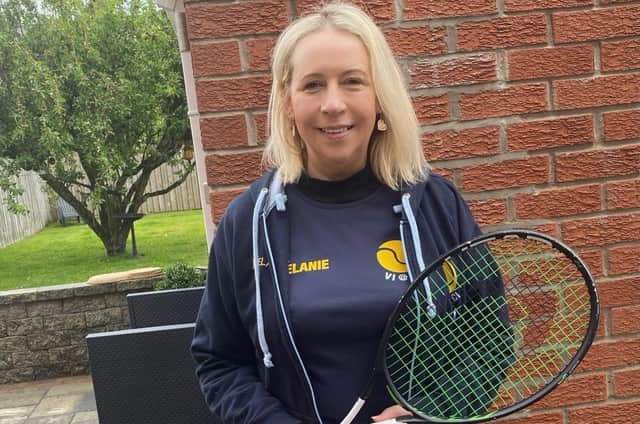Playing Visually Impaired tennis helps Melanie see life differently


When she was in her twenties, Melanie Stewart, now aged 52, started to notice changes in her eyesight.
“I first noticed my colours starting to fade and I was having a lot of headaches,” said Melanie.
Advertisement
Hide AdAdvertisement
Hide AdThe mum-of-two was eventually diagnosed with a condition called atrophy of the optic nerve, which has led to progressive sight loss.
Optic atrophy is a condition that results from damage to the optic nerve, which carries impulses from the eye to the brain. There is most often no known cause; however, possible causes include direct trauma, pressure on or toxic damage to the nerve, and nutritional deficiencies.
The symptoms of optic atrophy can include: blurred vision, difficulties with peripheral (side) vision, difficulties with colour vision and a reduction in sharpness of vision.
There is no real cure or treatment for optic atrophy and the outlook for people with the condition depends on what is causing the problem. Therefore, it’s important to have regular eye exams (especially if you have a family history of eye diseases), and to see your ophthalmologist immediately if you have any changes in your vision.
Advertisement
Hide AdAdvertisement
Hide AdMelanie said: “My eyes look completely fine, which can be an advantage and a disadvantage, as people don’t realise that I’m visually impaired.
“When I was diagnosed I had a young child and a job in banking that I enjoyed and it was a difficult time.
“As my sight loss progressed, my job got more and more stressful.
“After I took the decision to leave work, and my daughters were fully grown, that was when I really got down. I lost confidence and purpose.”
Advertisement
Hide AdAdvertisement
Hide AdFour years ago Melanie got in touch with sight loss charity RNIB and started to do some volunteering with them which she said really helped build her confidence.
She added: “I was first introduced to visually impaired tennis by RNIB’s community access worker, Olive Rodgers.
“I took some convincing but it has enriched my life so much.”
Visually Impaired tennis (also known as VI tennis, Sound tennis or Blind tennis) is one of the leading sports for blind and partially sighted people in the UK.
Advertisement
Hide AdAdvertisement
Hide AdIt was created in Japan in 1984 and has become popular across the world – it’s now played in more than 30 countries and has ambitions to become a future Paralympic sport.
This format of the game is different to traditional tennis – it’s played on a smaller court with a lower net.
Some courts also have tactile lines - so players can touch them - and players also use an audible tennis ball that makes noise so they can hear it bounce and being hit.
It is open to players of all ages, experience, fitness levels and abilities who have a visual impairment.
Advertisement
Hide AdAdvertisement
Hide AdThere are also adaptations that allow families to play together.
Melanie soon advanced at the game, made it onto the Irish team and qualified for the World Championships in Italy.
“That was just before Covid but unfortunately they had to be cancelled so I’ll try again!
“I have also recently become the outreach worker at my club, CIYMS Tennis Club in East Belfast.
Advertisement
Hide AdAdvertisement
Hide Ad“The sport is adapted for us in that we make use of tactile lines, sound balls and a smaller court size.
“Each player is allowed a certain amount of bounces of the ball according to their sight category.
“It’s mainly an indoor sport but fun to play outside too when the weather is good.”
“Most of us were complete beginners and for many of us it’s the first sport we’ve ever really played.
Advertisement
Hide AdAdvertisement
Hide AdMelanie added:“Some of us choose to play socially while others like to compete. We even have a men’s GB champion in our ranks.
“No matter what, we always have fun and then we head into the clubhouse to make coffee and chat. We’ve had some great weekends away in Dublin, Galway and in England and Wales and Spain.
“As players we have become well integrated with the sighted members and most of us have full club membership.
“Our brilliant volunteers are club members and great supporters of our sport. We shadow their internal tournaments with VI tournaments throughout the year.
Advertisement
Hide AdAdvertisement
Hide Ad“Last year the Captain and Lady Captain of the club joined us to play tennis wearing sim specs which simulate our various eye sight conditions.
“VI tennis is for everyone as it has sight categories to suit the amount of vision you may have and there’s also a category for those without sight.
“I can’t recommend it enough for fitness, fun and friendships.
“Hopefully we can move the sport forward and encourage more people and tennis clubs to get involved.”
Advertisement
Hide AdAdvertisement
Hide Ad“Through the RNIB ‘See Sport Differently’ campaign I want to share with others that adapted sport is for everyone.
“You can take it at your own pace, and get fitter and make friends along the way.”
*If you’re interested in seeing sport differently, whether getting involved in activities yourself, or in adapting an activity you coach for participants with sight loss, you can contact RNIB’s Helpline for advise and support on 0303 123 9999 or email [email protected]
Comment Guidelines
National World encourages reader discussion on our stories. User feedback, insights and back-and-forth exchanges add a rich layer of context to reporting. Please review our Community Guidelines before commenting.